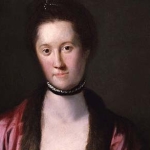Lo! where the rosy-bosom'd Hours,
Fair Venus' train appear,
Disclose the long-expecting flowers,
And wake the purple year!
The Attic warbler pours her throat,
Responsive to the cuckoo's note,
The untaught harmony of spring:
While whisp'ring pleasure as they fly,
Cool zephyrs thro' the clear blue sky
Their gather'd fragrance fling.
Where'er the oak's thick branches stretch
A broader, browner shade;
Where'er the rude and moss-grown beech
O'er-canopies the glade,
Beside some water's rushy brink
With me the Muse shall sit, and think
(At ease reclin'd in rustic state)
How vain the ardour of the crowd,
How low, how little are the proud,
How indigent the great!
Still is the toiling hand of Care:
The panting herds repose:
Yet hark, how thro' the peopled air
The busy murmur glows!
The insect youth are on the wing,
Eager to taste the honied spring,
And float amid the liquid noon:
Some lightly o'er the current skim,
Some show their gaily-gilded trim
Quick-glancing to the sun.
To Contemplation's sober eye
Such is the race of man:
And they that creep, and they that fly,
Shall end where they began.
Alike the busy and the gay
But flutter thro' life's little day,
In fortune's varying colours drest:
Brush'd by the hand of rough Mischance,
Or chill'd by age, their airy dance
They leave, in dust to rest.
Methinks I hear in accents low
The sportive kind reply:
Poor moralist! and what art thou?
A solitary fly!
Thy joys no glitt'ring female meets,
No hive hast thou of hoarded sweets,
No painted plumage to display:
On hasty wings thy youth is flown;
Thy sun is set, thy spring is gone—
We frolic, while 'tis May.

















Comment form: